|
There are about a million things I could say in praise of being a Catholic in Rome. The Eternal City is one of the most significant locations for our faith, and it is almost impossible to come here and not experience Catholicism in some way. Everywhere you turn there is an incredible church that you’ve never even heard of, a monument related to our past, and of course the constant shadow of Saint Peter’s. But beyond that, the history and culture of the city are impossible to separate from the role this place has taken in forming and guiding our Church throughout centuries. You can become almost supersaturated with the beauty of it all, and if you choose it, the experience of being here can be transformative in the faith. But what does it specifically mean to be a young Catholic in Rome? How can you describe the experience of being in one of the oldest places, while simultaneously knowing that you are one of the newest things on the planet? And what responsibilities do we have as young people while here, especially during the current Synod? I am so lucky to be able to study abroad in Rome this semester. One of my classes here is Church History, which includes a weekly visit to a historical site of the faith and a discussion of its role and development within the early Church. I’m a little shocked at how much I thought I knew, and then learning something I never understood about our past. Nothing is more convincing of the fact that the Church is a survivor than one look at its history. The number of upsetting things that I have learned about in the Church’s past are always overcome somehow by the next generation in a manner and consistency that is honestly shocking. Today, this strikes close to home for me, and I’ve come to more deeply see my role and responsibility as a young person called to renew the Church. My course on Church History has been eye-opening in understanding the adaptability and beautifully dynamic nature of our faith, as well as the importance of strong members of the Body of Christ stepping forward to guide her in holiness. In Rome, the city itself is a testimony to the consistency of the faith and its principles, as well as the varied ways this faith has been passed down over the centuries. This is the knowledge that dictates the responsibility of a young person in Rome. It is a gift to be here and a privilege to see these places that hold such significance in our faith. But to view being a young person in Rome as a mere occasion to take and absorb the city without seeing the opportunity and even responsibility to contribute something to the narrative would be a mistake. If there is any place to learn that the Church is built on the living out of the Gospel, it is here, where ancient structures meet the next generation in the ever old-young duality so present in our faith. The Synod of Bishops on Young People, the Faith, and Vocational Discernment is going on in my (current) backyard and is literally designed for me as a young person! One of the coolest sections of the Instrumentum Laboris (the working document of the Synod), in my opinion, is Chapter V, titled “Listening to the Youth,” where it talks about what it means to be open to the real and organic ideas and needs the youth have. It is our responsibility now to take up the Church on her offer to listen to young people by speaking. You don’t need to be the most involved person in the Synod, but perhaps you can learn more about it, read the documents that come forth from this meeting, pray for good fruit to bear, and engage with what is going on. To be in Rome as a young person right now is to be in Rome trying to make our faith more understandable and encounterable for all young people. It is more than an opportunity to evangelize, it is a responsibility. The Synod talks about Jesus’ role as a young man preaching to a young Church. How incredible is it to be the echo of that in the present Church today? May God give us the grace to live that role well. For more resources on the Synod on Young People, the Faith, and Vocational Discernment, please click here.
0 Comments
Christian accompaniment is best understood through the Gospel story of the Road to Emmaus. If Emmaus is Heaven, each of us is on our own journey: afraid, confused, and attempting to make sense of the joy of the Resurrection. Each of us needs someone to walk beside, someone who will minister to us by simply listening, then understanding, and advising. On this journey, our earthly traveling companion is on one side and Jesus is on the other. The disciples couldn’t have come to understand the Paschal Mystery or their relationship with it until they let Christ be their guide.
As a precursor to the 2018 Synod, the Synod of Bishops released their working document, or Instrumentum Laboris, on Young People, the Faith, and Vocational Discernment. In its second part, the document discusses the necessity for vocational accompaniment, defined as “a process that is able to unleash freedom, as well as the capacity to give and to integrate the various dimensions of life within a horizon of meaning.” Though a rather lofty definition, it is clear that accompaniment centers around a proper understanding of discernment. Discernment can be a confusing Catholic buzzword. For some, the mere thought of it causes extreme panic, while others understand it as equivalent to “religious life.” I can’t count the number of conversations I’ve had where someone leans over to me and asks in a hushed tone, “Are you discerning?” to which I respond bluntly, “EVERYONE is discerning!” Every young person is constantly discerning not only our capitol “V” Vocation (such as a call to religious life, the priesthood, or to marriage), but also our vocation for every year, month, or moment of our lives. Each day is an opportunity to ask to know God’s will. Even a small daily prayer invites Him to let the Spirit work in our lives. With this definition of discernment in mind, accompaniment is the simple act of being present to someone, forming a relationship in order to walk with him or her towards an understanding of Christ’s will. The Synod’s Instrumentum Laboris says that there are many kinds of accompaniment. Whether it be formal spiritual direction, psychological accompaniment, advisement from a trusted elder, etc., accompaniment is necessary for the spiritual journey. We cannot live out our faith alone. We need others to share with, to learn from, and to pray with in order to grow as children of God. In my own journey, I have been blessed to be accompanied by many different disciples. My parents were the first to show me what it means to be accompanied in and through love. In high school, a few wonderful teachers gave me room to grow and begin to understand how Christ was speaking in my life. In college, I learned how to open myself to totally new companions and walk with college-aged ministers. In the most traditional sense, an excellent diocesan priest and longtime friend welcomed me in spiritual direction last year and together we learn how God is calling me to serve Him as I grow as a person and daughter. I know accompaniment is important because when I try to walk the road alone, I am met with a sense of isolation and confusion. When I made the decision to study abroad in Rome for the semester, I never realized the sort of impact it would have on my spiritual life. Leaving my closest companions, faith friends, and spiritual director behind in the United States, I felt unable to cope with the new challenges I’m facing. I’ve come to realize that without those spiritual relationships, the journey towards Christ becomes far more difficult. To accompany and to be accompanied are not positions to be taken lightly, and hopefully this Synod will show the Church how to better foster these sorts of relationships. In a time where many of us are feeling betrayed or isolated by the Church, it is difficult to trust that She is the source of these types of reliable and authentic relationships. As young people, however, we have to trust in the healing mercy of the Holy Spirit and the grace bestowed upon our Church’s shepherds. It is not an easy time to be a Catholic or a young person, but that is all the more reason for us to persevere on the journey with a companion on one side and Christ on the other. Throughout the month of October, the Church gathers in Rome for the Synod of Bishops on Young People, the Faith, and Vocational Discernment. For generations, young people have heard that they are the future of the Church, and now Pope Francis, bishops from all over the world, auditors from various fields including youth and young adult ministry, and even some young people gather within the Synod hall to discuss this future and the young people that will help move the Church forward. On October 6, 2018, the University of Notre Dame’s Center for Ethics and Culture hosted an event in Rome titled, “’Behold, I make all things new’: A Conversation on Youth, Faith, and Vocational Discernment.” The event kicked off with a reception where members of the media, members of the audience, and Synod participants spent time talking and getting to know one another. Seemingly always talking with someone new was John Allen Jr., the founder and editor of Crux, the Catholic news outlet that was co-sponsoring the event with UND. As the start time of 7:30 approached, Mr. Allen announced in a loud voice that the Synod session had run long and the Bishops would be there soon. After the audience had gotten settled in the hall, Bishop Barron, Auxiliary Bishop of Los Angeles, and Bishop Onah of Nigeria entered the hall to a round of applause. Dr. Pia de Solenni, the Chancellor of the Diocese of Orange, moderated the event and welcomed Bishop Onah to give some opening remarks. After Bishop Onah shared some words, the six participants gave short testimonies to the audience and bishops present about their lives as Catholics. These participants from across the world, including countries such as China and Bermuda, shared about their relationships with the Church and God, the influence their families and friends had had on them, and their hopes for the Synod. The audience was clearly moved by these young people, not only by their courage to get up and speak in front of this crowd, but by their love for the Catholic Church and God. After the testimonies had finished, Bishop Barron and John Allen began a conversation on the topic of the Synod that was moderated by Dr. de Solenni. Mr. Allen provided interesting and challenging questions to Bishop Barron, but both provided an insightful view into the Synod and the different paths that the discussion and prayer could take. After the conversation, Bishop Onah was again invited up to provide his thoughts and reflections on the six young people’s testimonies. Bishop Onah’s enthusiasm for young people and trust in the Holy Spirit’s guidance of the Synod was obvious, and the passion with which he spoke was infectious. The event ended with a few questions taken from the audience and answered by Bishops Barron and Onah. One of the topics of these questions included beauty in sacred spaces, including an explanation of the Faith while presenting it as true and beautiful. Bishop Onah’s answer was remarkable. He pointed to the universality of the Church, witnessed by all of the different nations and peoples present and active at the Synod, as a manifestation of the Church’s beauty. He left the entire room, Bishop Barron included, speechless. We prayed together, concluding the evening by joining our hearts to God and focusing on the beauty that he’s given us in the Church. I couldn’t think of a better way to end, and a better thing to reflect upon as the Synod continues. “Dear young people, let yourselves be taken over by the light of Christ, and spread that light wherever you are.” Pope St. John Paul II’s words to the participants of World Youth Day 2002 in Toronto are as true now as they were over fifteen years ago. As the Church prepares for a Synod of Bishops to discuss Young People, the Faith, and Vocational Discernment, Pope St. John Paul II’s words are a great call to prayer. The Synod of Bishops was established in 1965 by Bl. Pope Pius VI (who will be canonized during this year’s Synod) to meet whenever the current pope deemed it necessary or opportune to gather the world’s bishops to discuss important matters within the Church. Before the October 2018 Synod, the most recent synod will have been the 2014 Extraordinary Synod that was called to discuss the topics of family and evangelization, out of which came Pope Francis’ exhortation Amoris Laetitia, the Joy of Love. This Synod has been called by Pope Francis and is the 15th Ordinary Synod of Bishops. The Instrumentum Laboris, or the working document for the Synod (available here) was created after listening to groups of young people from all backgrounds, ethnicities, and geographic regions. It discusses important topics, like what it means to be a young person today, accompaniment, vocational discernment, evangelization and our universal call to follow Jesus. Even after the publishing of the Instrumentum Laboris, Church leaders will continue to gather young people across the world to listen to them on these important issues to decide how best the Church can move forward. These are serious matters facing the Church, especially our Church here in the US, as vocations to the priestly and religious life seem to continue to decline and Church attendance dwindles. As a student at The Catholic University of America (CUA), I feel that there is great hope in this generation. You need not look further than the on-campus Masses and weekly Adorations to see that the Holy Spirit is moving within our youth. Yes, the small student body of CUA is surely not indicative of the entirety of young people in our country—but if you look to other Catholic institutions and talk with high school ministers, youth ministers, and religion teachers, there’s reason for optimism. This summer, I was a counselor for Light the World, a summer institute organized by CUA’s School of Theology and Religious Studies. I was blessed to minister to about fifty high schoolers from across the country. While fifty might not seem like that big of a number, it was a sampling of the young people who are looking for Christ in their lives, a sampling that gets bigger and bigger when you add programs like the Steubenville Conferences, Life Teen camps and events, and other independent conferences and events (not to mention World Youth Day!). It is through the witness of young men and women like the ones at Light the World that we can find hope in times so desperately in need of it. In my experience, I have seen that this is a generation being moved by the Holy Spirit. We are grateful that the Church is inviting young people to share their thoughts, ideas and experiences, and pray that she will use what she learns to create a stronger and more unified Church moving forward. The optimism of our young people is a call to prayer and action, both on the part of our Bishops and clergy and that of the laity. Let us look to our great saints who had devotion to young people, like Pope St. John Paul II and St. Vincent Pallotti, as our guides in order to see the Church grow and flourish in the good works that Christ has called her to. Our youth can also look to young saints such as Bl. Pier Giorgio Frassati and St. Maria Goretti as inspirations of holiness to help guide them closer to Christ. This Synod will be a good first step in figuring out how the Church can better accompany and encourage its young people to be saints, but it cannot be the final step. In the coming months, more writings and documents will come out of the Synod, pastoral plans and diocesan initiatives will emerge, and new ways of ministry and accompaniment will come. It is through prayer that the Synod and the resulting actions will bear good fruit; and it is in Christ alone that we will find our hope. During this momentous time in our Church, let us pray for our young people, for an increase in holy vocations, and for the will of God to be done. For more information on the upcoming Synod, please click here. “Everything is well when it is done as God wishes.” – St. Vincent Pallotti
In October, there will be a Synod of Bishops devoted to the interconnection between faith and vocational discernment in the lives of young people. When a person in Catholic circles, especially a young person, says that she or he is “discerning a vocation,” usually this means consecrated life or priesthood. More often today, though, it also includes discernment of whether one is called to the vocation of marriage. Over the last two decades, I have had the privilege of accompanying numerous young adults who are discerning their vocation. As they have come to a decision about a life vocation, I have witnessed their marriages, consecrations, and ordinations. During this year alone, many months have been filled with the joy of such events which will continue into the foreseeable future. Such moments bring me great joy as they should for the Church. More so, though, we are called to discern the ways in which we can live our primary vocation, the call to holiness. This call, as the Second Vatican Council taught, is “universal” (Lumen Gentium, c. V) It is what God desires of all human beings, to live in a loving union with God and neighbor that leads to salvation. Pope Francis teaches us in Gaudete et Exsultate that “This holiness to which the Lord calls you will grow through small gestures” (GE, 16). Small gestures lead to larger action through discernment. Is such discernment easy? No. In fact, it is challenging and difficult and can be a cross. But, we are called to take up our cross and follow (Mk 8:34) since no one is called to be a professional discerner. We are called to make choices that are for Christ and witnessed through our love and care for our neighbor. Simply praying, thinking, or talking is not enough. We are challenged to move forward. “It involves striving untrammeled for all that is great, better and more beautiful, while at the same time being concerned for the little things, for each day’s responsibilities and commitments” (GE, 169). May the Charity of Christ urge us on! In God, the Infinite Love, Fr. Frank In my work at the Catholic Apostolate Center, and as a self-identified millennial, I am frequently asked: "How can we bring young people back to the Church?" It's a question I get asked a lot by people who are my parents’ age and older, mainly because they see their children, grandchildren, or nieces and nephews ‘willingly’ leaving the Church. Fortunately, our Church across the globe is also asking this very question during its October 2018 synod on Young People, the Faith, and Vocational Discernment. In preparation for the synod, the Vatican recently released the Instrumuntum Laboris (Latin for "working instrument") for the bishops of the world to review, discuss, and offer insights to Pope Francis. The document talks about the challenges that face young people, classified as those aged 16-39, in the Church and world today—from being an individual in a global society, to finding meaning in life, to living in an increasingly materialistic world, etc. —and then discusses possible solutions to these problems. The document suggests that solutions for individuals vary, but that all begin with discernment through accompaniment. When we speak of accompaniment, we might think of one person who helps another work through some difficulty by offering insight or expertise on how to overcome it – kind of like a coach. Instrumuntum Laboris, however, emphasizes that the accompaniment is not just a simple form of coaching, but rather: "...true accompaniment will strive to present vocation not as a pre-determined fate, a task to be carried out, a ready-made script, to be accepted by discovering how to implement it effectively. God takes seriously the freedom He has given to human beings, and responding to his call is a commitment that requires work, imagination, audacity and willingness to make progress also by trial and error" (Instrumentum Laboris, 121). It is through accompaniment that young people (and by extension all people) can understand the power of God in their lives because they see God working through that other person. This mentor helps the young person to see how God calls each and every one of us to be a messenger for the Word of God. The mentor also helps the young person to discover the best way to use his own talents and gifts for the Mission of the Church. The hope is that through this pairing, the spiritual growth of the individual will lead to the spiritual growth of the universal Church. Now the next questions to ask are: "Who is a mentor? What does a mentor look like?" Our Bishops and Magisterium have wisely begun to ask this question as well and have devoted an entire section of Instrumentum Laboris to mentorship and the ideal mentor: "[A mentor is] a faithful Christian who engages with the Church and the world; someone who constantly seeks holiness; is a confidant without judgement; actively listens to the needs of young people and responds in kind; is deeply loving and self-aware; acknowledges their limits and knows the joys and sorrows of the spiritual journey ... mentors should not lead young people as passive followers, but walk alongside them, allowing them to be active participants in the journey" (132). From my experiences with my mentors and as a mentor myself, as well as the experiences of friends and co-workers, I understand that active participation is the key. Unlike a coach who watches his players from the sidelines, a mentor is someone who walks with his mentee on the journey to holiness, allowing himself to grow in holiness as well. Spiritual accompaniment, as the document states at different points, is not easy—in fact it is quite difficult. It requires a deep love of Church, confidence, humility, self-awareness, and commitment. It takes time and dedication, like all strong relationships do. It requires an understanding that our faith is not passive, but rather a calling "to go and make disciples of all nations.” We are all called—priests, religious, and lay—to be mentors to those of all ages, demographics, and steps in their faith journey. Let us pray that God reveals to us those whom we are called to mentor and that we have the courage and strength to walk alongside them in our shared pursuit of holiness. Question for Reflection: What aspects of myself are well suited to mentorship? How can I continue to develop those traits or skills?
“But this I will call to mind; therefore I will hope: The Lord’s acts of mercy are not exhausted, his compassion is not spent; They are renewed each morning—great is your faithfulness!”
-Lamentations 3:21-24 Reflecting on the theme for this year’s Mid-Atlantic Congress—"Hope”—I feel as though the idea of hope seems a radical one to even consider today. Every morning, we’re confronted with more bad news: refugees, war, political espionage, starvation, violent crime, and even mass shootings in our own communities. It’s enough to make you throw up your hands and cry out, “Just make it stop!” And that’s exactly why we need hope. With the current state of the world, focusing on the theme of hope is one of the most important things we can do as a community of faith. We often hear that things are in crisis: the family, the Church, our nation, our whole world. But what we encountered at MAC this year looked nothing like crisis. In fact, it looked very much like hope. In our conversations with participants, the Catholic Apostolate Center staff witnessed a fire that, in charity and love, seeks to transform the world with the good news of the Gospel. And while it’s easy to get caught up in the excitement of being surrounded by passionate and hard-working people, there are ways we can carry that hope and momentum forward into our parishes and communities. The Catholic Apostolate Center participated in four presentations this year at the Mid-Atlantic Congress. In our presentation discussing Living as Missionary Disciples, the U.S. Bishops’ guide for pastoral planning, we were able to provide basic principles of missionary discipleship and evangelization. We talked about where the Church in the United States is heading with its evangelization and pastoral planning efforts and together brainstormed practical ways to implement these ideas in our own parishes and dioceses. By collaborating with other members of the Church, and helping to form missionary disciples, our work can change the narrative of hopelessness we often see in the world. The Center also engaged in fruitful conversation about how to equip young adults to enter into the mission the Church calls us to: becoming missionary disciples, or everyday evangelizers. The session highlighted work being done in several archdiocesan and post-collegiate formation programs, such as Apostles on Mission. We also reflected on the importance of fostering a greater sense of vocational discernment among young adults—a theme on which the Church will continue to reflect in the upcoming Synod on Young People, the Faith, and Vocational Discernment. Regarding our schools, the Center had the opportunity to reflect on the complexities of the role of principals as Lay Ecclesial Ministers. Acting as part-administrator, teacher, janitor, crying shoulder, cheerleader, and lunch monitor, a principal is also a school’s connection to the local parish and diocese. They take on a complex role in today’s world and, from the discussion in our session, are eager to renew their commitment to helping form the next generation of missionary disciples. Finally, the Center unpacked the idea of collaboration from the beginning as it can apply to pastoral planning. With so many new (rather, renewed) ideas being proposed by Pope Francis and the bishops, wrapping one’s head around the various buzz words, new terminology, or different pastoral methodologies can seem overwhelming. Our conversation touched on co-responsibility, missionary discipleship, and entering into pastoral planning with a spirit of discernment and collaboration. It was encouraging to see pastoral leaders rising to the challenge of being co-responsible missionary disciples ready to share the hope of Jesus Christ. At MAC this year, we experienced hope: hope in the Lord, hope that will not disappoint, and hope that sends us forth. We saw the excitement and fire that comes from hope, which will be taken home to our parishes, schools, and dioceses to transform the world. We thank all who engaged in conversation with us at MAC and challenge you to proclaim the hope of the Gospel to the world. To listen to our presentations from this year’s Mid-Atlantic Congress, please click here. “…the Church wants again to state her desire to encounter, accompany, and care for every young person, without exception.” -Pope Francis What is the role of youth and young adults within our Church? How can the Church better listen to their desires, dreams, and needs, and empower them as contributing members of the Body of Christ? What are young people seeking and how can the Church better minister to them during this transformative time in their lives? These are a few of the types of questions asked and discussed at the National Dialogue on Catholic Pastoral Ministry with Youth and Young Adults in Chicago from September 17-19. With representatives from almost fifty Catholic organizations, apostolates, and diocese around the United States, the National Dialogue brought pastoral leaders working with youth and young adults together in order to discuss the future of pastoral ministry to the young church. This dialogue was called for by the United States bishops and co-hosted with the National Federation for Catholic Youth Ministry (NFCYM) and the National Catholic Network de Pastoral Juvenil Hispana (LaRed). The National Dialogue was organized to unify, engage, and mobilize church leaders working with youth and young adults in preparation for the XV Ordinary General Assembly of the Synod of Bishops on “Young People, the Faith, and Vocational Discernment” called for by Pope Francis in Rome in October of 2018, as well as the V Encuentro called for by organizations advocating for Hispanic Ministry. According to their website, “The vision of this initiative is an energized and unified Church committed to forming and engaging youth and young adults as missionary disciples.” The Catholic Apostolate Center was honored to be invited to participate in the National Dialogue this year. As a ministry of the Society of the Catholic Apostolate (Pallottines) - Immaculate Conception Province founded in 2011 to respond to the needs of the church, the Center has worked with and for active young adult Catholics in a variety of ways. Most notably, the Center has developed the ten-week formation program Apostles on Mission in collaboration with the Archdiocese of Washington to help young adults become active evangelizers. As our patron, St. Vincent Pallotti, believed, we are all called to be apostles—what Pope Francis calls missionary disciples. Through efforts such as Apostles on Mission, as well as our online Catholic resources, webinars, podcasts, social media presence and blog, the Catholic Apostolate Center works to revive faith, rekindle charity, and form apostles across all ages and experiences within our Catholic faith. As Pope Francis wrote in the Preparatory Document for the 2018 synod, “Proclaiming the joy of the Gospel is the mission entrusted by the Lord to His Church.” We are excited to see how the collaborative fruits of the National Dialogue help us to fulfill that mission and continue to work to spread the joy of the Gospel each day. “Love is…the fundamental and innate vocation of every human being.” (John Paul II, Familiaris Consortio, 11). Mankind was created in the image and likeness of God in order to love and to be loved. This divine vocation is made possible by the Father’s love for us: we love because we were first loved (cf. 1 Jn 4:10). In October of 2014 and 2015, bishops from around the world met at the request of Pope Francis to discuss human love, specifically in the context of marriage and family. The themes touched upon included "the pastoral challenges of the family in the context of evangelization" as well as "the vocation and mission of the family in the Church and in the contemporary world." After two years of discussion, reflection, prayer, and deliberation, the Holy Father compiled the ideas gathered from the synods into a post-synodal Apostolic Exhortation, Amoris Laetitia. Using both poetic and approachable prose, Pope Francis shared with the Church his insight into the joy and dignity of human love—writing on topics such as the Church’s teaching on marriage and family, the education of children, and pastoral strategies for marriage preparation. On July 12th, Center Director Fr. Frank Donio, S.A.C. used the wisdom found in Amoris Laetitia to present on its pastoral implications for marriage preparation using Facebook Live. You can view his presentation here. Below are nine quotes and lessons from this historic document that are especially pertinent to couples preparing for marriage and those preparing couples for marriage. I invite you to spend some time reading these quotes, reflecting on them, and implementing the truths they contain into your understanding of marriage and marriage preparation. 1. Marriage Preparation begins at birth Marriage preparation begins from birth – we are born into families, grow up in the context of family, and are surrounded by families throughout our lives. For this reason, Pope Francis says that “Learning to love someone does not happen automatically.” It is a lifelong process which we must choose to grow in each day. 2. Quality of content over quantity. As couples gather together to prepare for marriage, Pope Francis recommends that we do not overwhelm them with every single resource from the Catholic Church. Since the time of marriage preparation is usually brief, the Holy Father recommends sharing quality information—such as the fundamental aspects of marriage, church teaching, and a basic understanding of the kerygma, or story of salvation. Marriage preparation should be comprehensive, but it cannot be exhaustive or total. Be prudent and intentional about the quality and quantity of information you are sharing. 3. Highlight prayer as an essential part of marriage. Prayer is fundamental not only to the Christian life, but to any vocation. For the lifelong commitment of marriage to succeed, it must be rooted in the daily prayer of husband and wife. This prayer has two dimensions: personal and communal. Personal time of prayer and reflection ensures that each spouse is growing in their relationship with Christ, while prayer as a couple unifies the spouses, improves their communication with one another, and grounds their relationship in Christ. When both personal and communal prayer are alive within a marriage, the relationship of husband and wife is being revitalized and strengthened in such a way that can reflect the love of the Trinity and pour out into society as a whole. 4. Marriage is a life-long commitment. Sacraments and major life events should be celebrated in a way outside of our ordinary day-to-day life. Marriage is no different. We are, in fact, celebrating something beautiful and life-changing. However, we should not let ourselves be carried away by the details of planning the “perfect wedding day.” Pope Francis advises couples not to get too invested in the consumption of material goods or the planning of the wedding day itself, inviting them instead to focus on rooting their relationship in Christ, the sacraments, and prayer. 5. Marriage is more than the wedding ceremony. Marriage preparation encompasses much more than a formal program, retreat, class, or a weekend geared to meet a checklist for the church. Formal marriage preparation should help couples discover the dignity of the married vocation and set their sights on the life they will make together as “one.” The ceremony is not “the end of the road,” as Pope Francis states, but a necessary part of the sacrament. We are called to help couples see the wedding ceremony as a launchpad moving them forward in their life-long calling. We are furthermore called to give couples the tools and strategies for successfully working through trials and difficult moments together. 6. Marriage is “total.” The Catholic Church affirms marriage as an indissoluble union grounded in fidelity, fruitfulness, freedom, and totality. Marriage is not simply a convenient relationship, a partnership with someone who makes you happy, or a public display of love—though it can comprise all of those things. The Church understands that marriage is a sacrament administered by man and wife, witnessed by the Church community, and blessed by God. It is a serious but heroic, joyful, and sanctifying undertaking “until death do us part.” 7. Give couples the tools they need to detect danger signals in their relationships and respond constructively. Preparation for marriage should be filled with joy. However, it is still a time of preparation. Each relationship will have moments of unity and conflict. A couple may agree on issues like raising children or budgeting, while disagreeing on how to spend free time or how to best communicate. It is important for each couple to be aware of any sources of woundedness or conflict in their relationship before the wedding day in order to work on constructive practices for moving forward. 8. Explain the significance behind the liturgical celebration and the meaning of each of its signs. While we are not called to get “wrapped up” in the wedding day, we are called to dispose ourselves to the profound significance of the liturgical celebration of marriage. Marriage is a sacrament. To enter into this sacrament is of vast significance. For this reason, it is important to learn more about and understand the meaning behind the signs used in the liturgical celebration – the rings, the white dress, the vows, etc. Let us help couples preparing for marriage enter into the wonder of the sacrament through the richness of the liturgical celebrations of the church. 9. Help couples preparing for marriage discover or rediscover the dignity and beauty of marriage. It’s tempting to be disheartened by the lack of successful marriages we see in the world around us. Marriages can be overwhelmingly broken, destructive, or lifeless. This is not part of God’s original plan for marriage, and Pope Francis wants to encourage engaged couples to discover or rediscover the dignity and beauty of marriage as a liberating, sanctifying, unconditional relationship in which each spouse is loved and affirmed. How can you support married couples or those planning on getting married? How can you change the marriage narrative to better reflect God’s plan? For more resources on Marriage and Family, please click here.
One month ago, I had the privilege of celebrating Mass on the altar above the tomb of St. John Paul II. Our small pilgrimage group had requested a Mass at one of the altars, either in the crypt or in St. Peter’s Basilica itself. We never expected that we would be given this particular altar, and all in the group were rather excited. One of my friends, who is an American serving on the general council of his religious community, asked me how we had arranged it. He had been trying for months through various contacts in the Vatican. I told him how we asked simply for a Mass in the basilica. Of course, he was very surprised that no special arrangements had been made. I was simply thankful to the Holy Spirit for arranging it and giving both the pilgrims and me such an important spiritual opportunity. As we made our way to the altar of St. John Paul, we went by the tomb of St. John XXIII. I hope someday to celebrate a Mass on the altar above his tomb as well. Both are personal heroes of mine because of their efforts to expand the role of all in the Church, especially the laity, which was so central to the charism of the founder of my religious community, St. Vincent Pallotti. In his homily for their canonizations, Pope Francis spoke about the efforts of these two popes in this regard:
John XXIII and John Paul II cooperated with the Holy Spirit in renewing and updating the Church in keeping with her pristine features, those features which the saints have given her throughout the centuries. The renewal and updating of the Church called for by the Second Vatican Council, initiated by St. John XXIII, is central to the work of the New Evangelization as articulated by St. John Paul II. This work continued through the efforts of Pope Emeritus Benedict XVI, especially in the Synod on the New Evangelization, and is finding even greater momentum through the witness of Pope Francis. All of them, along with Blessed Paul VI, the teaching of the Council, and Church leadership in general, have called all of the baptized to engage in greater co-responsibility for the life of the Church and for the work of evangelization. When Pope Francis canonized St. John XXIII and St. John Paul II together, various pundits, both in Church and secular media, were quick to give their sometimes very simplistic analysis of the message that he was trying to convey. If there was any “message”, I believe that it is a continued or re-commitment to the on-going renewal of the Church in trustful cooperation with the Holy Spirit and in prayerful communion with the saints. St. John XXIII and St. John Paul II were both visionary leaders who put forward programmatic plans for not simply renewal of the Church as an institution, but renewal of all the baptized in faith and holiness who are called to go forth into the world and renew it as well. In 1959, St. John XXIII said, “Profession of the Christian faith is not intelligible without strong, lively apostolic fervor” (Princeps Pastorum, 32). The Second Vatican Council confirmed this understanding in Lumen Gentium through its teachings about the Universal Call to Holiness and the role of all the baptized in the mission of Christ. St. John Paul II was one of the drafters of the Decree on the Apostolate of the Laity (Apostolicam Actuositatem) along with the then Rector General of the Society of the Catholic Apostolate, Fr. Wilhelm Möhler, S.A.C. St. John Paul taught in his apostolic exhortationChristifideles Laici, which followed the Synod on the Laity in 1987, that The Second Vatican Council has reminded us of the mystery of this power and of the fact that the mission of Christ – Priest, Prophet-Teacher, King – continues in the Church. Everyone, the whole People of God, shares in this threefold mission’” (14). Sharing in the mission of Christ is not simply staying within the confines of the church building. Instead, especially in this time of the New Evangelization, all of the baptized are called to recognize that they are followers of the Christ who are sent on mission by him. In fact, Pope Francis even calls the baptized, in Evangelii Gaudium, “missionary disciples” (120). Fr. Frank Donio, S.A.C., is Director of the Catholic Apostolate Center and teaches for Saint Joseph’s College Online. This blog post was first published on February 4th on the St. Joseph’s College of Maine Theology Faculty Blog. Click here to learn more about our cooperative alliance with St. Joseph’s College Online “Deeds done well.” Note the emphasis that St. Vincent Pallotti places on how things are done. Too often there are many deeds that are not done well. They are done in a half-hearted, almost mechanical way. This is a “maintenance” mentality, as noted by the 2012 Synod on the New Evangelization. A missionary mode of operating, as emphasized by the Synod and by Pope Francis in Evangelii Gaudium, was at the core of the actions of St. Vincent Pallotti. Today is Pallotti’s feast day. As founder of the Union of Catholic Apostolate, an association of lay people, consecrated persons, and clergy, a part of which is the Society of the Catholic Apostolate (Pallottine Fathers and Brothers), he understood the need for all Christians to be people of action, apostles of Christ.
Today in Washington, D.C., thousands and thousands of people are taking to the streets in a show of action for life. One of the things that characterizes this effort is the joy that those who participate show in witness to life. Sometimes people of action, including Catholics, do not show joy in their actions. Joyful action will draw others, invite others, unite them, and send them forth to collaborate for the good of the Church and for the world. As we celebrate today the feast of the Patron of the Catholic Apostolate Center, St. Vincent Pallotti, I invite you to reflect on the the words of St. John Paul II and to do many deeds to make them a reality: “Continue to multiply your efforts so that what was prophetically announced by Vincent Pallotti, and the Second Vatican Council authoritatively confirmed, may become a happy reality, that all Christians are authentic apostles of Christ in the Church and in the world” (Homily of June 22, 1986). St. Vincent Pallotti, pray for us! May the Charity of Christ urge us on! Fr. Frank Donio S.A.C. is the Director of the Catholic Apostolate Center This past spring, Pope Francis went on a pilgrimage to the Holy Land with the motto, “So that they may be one.” On November 12, we celebrate a saint who lived by this motto, St. Josaphat.
St. Josaphat was an Eastern Rite bishop and model of Christian unity. He was martyred in an effort to bring part of the Orthodox Church into union with Rome. He was born John Kunsevich in 1580 to a Catholic family in what is now modern day Ukraine. Clergy who were seeking and supporting reunion with Rome influenced Kunsevich at a young age. This led him to become a Basilian monk and priest. He lived as a preacher and ascetic. Josaphat was elected bishop of Vitebsk in 1617 and became archbishop of Polotsk in 1618. Through synods, catechesis, reform of the clergy, and personal example, Josaphat influenced the greater part of the Orthodox in the area of Vitebsk to unity. He remained steadfast in his beliefs by opposing Latins who saw unity only in Latin terms. Likewise he suppressed Byzantine traditions in the name of Catholic unity. An Orthodox archbishop was appointed in Polotsk and Josaphat was accused of taking office invalidly. Many of the Byzantine Catholics were won over to allegiance to Orthodoxy. The Latin bishops of Poland did not support him. In 1623 Josaphat went to Vitebsk to bring peace and preach to churches to reconcile differences. On November 12, a mob broke into the house where he was staying, shouting hatred and violence. He was struck in the head with an axe blade mounted on a long shaft, and shot. His body was thrown into a river after the upheaval. An article from EWTN writes, “It is important to say that there was a martyr on the Orthodox side as well, and even good men were uncertain where truth and justice lay. St. Josaphat died working for reconciliation, and peacemakers often find themselves hated by both sides.” Four hundred years later Church leaders are supporting the same cause for unity. St. Josaphat did not have all of the answers, but he did know that following Christ and working toward forgiveness and peace were worth the pain of confronting those who hated him. He was canonized by Rome as the first saint of the Eastern Church. Pope Francis displayed this sentiment in conversations with the Orthodox Church while visiting the Holy Land a year after he spoke about the treasures of Christians. He noted that “we Christians bring peace and grace as a treasure to be offered to the world, but these gifts can bear fruit only when Christians live and work together in harmony.” He shares the convictions of St. Josaphat and the gifts they bear. It is an important reminder of the responsibility we share to promote unity among all Christians. Sophie Jacobucci is a recent graduate of the Echo Program at Notre Dame and currently lives in Denver, Colorado. On October 8, 2013, Pope Francis announced that in October 2014 there would be an Extraordinary General Assembly of the Synod of Bishops on topics related to the family and evangelization. A year later, more than 250 participants, including 14 married couples from around the world, gathered in Rome to find ways to improve the pastoral application of church teachings, ways to explain it, and to help Catholics live it. The goal of this synod was not to reach definitive conclusions but rather set the agenda for a larger world synod in October 2015. Until then, the 185 bishops in attendance would share what was discussed in the Synod with their respective dioceses in preparation for implementation before sharing their experiences with and making recommendations to the Holy Father.
It is on such an occasion that we reflect on the office of the bishop, men who are “endowed with the authority of Christ” by virtue of apostolic succession to “exercise their pastoral office over the portion of the People of God assigned to them” (CCC 888, 886, cf. 2 Timothy 2:2). These men are much more than diocesan administrators of the Church— by virtue of their identities as the successors of the Apostles, they wield the same power and authority to govern the universal Church as that given to their predecessors by Christ. Together, with the Bishop of Rome (the successor of Peter), and assisted by priests and deacons, the college or body of bishops tend to their local Churches; by ruling them well, each bishop contributes “to the welfare of the whole Mystical Body, which, from another point of view, is a corporate body of Churches” (CCC 884-886). The role of the bishop is threefold: to teach, to govern, and to sanctify. With priests as co-workers, the bishop’s first task is “‘to preach the Gospel of God to all men,’ in keeping with the Lord’s command” (CCC 888). In order to preserve the purity of the Faith first entrusted to the Apostles, Christ extends a share in His own infallibility to the bishops of the Church who are working in communion with the Pope (CCC 890). This Magisterium, then, is tasked with overseeing the spread of the Gospel and addressing any misunderstandings regarding the Church’s dogma; in matters of faith and morals, the extraordinary Magisterium is infallible, particularly when assembled in an Ecumenical Council or proposing a doctrine “for belief as being divinely revealed” (CCC 891). Secondly, each bishop governs his local Church (i.e. diocese) by his counsels, exhortations, and example. Though he has authority and sacred power, the bishop exercises them— in communion with the whole Church and under the guidance of the Pope— in a spirit of service to those entrusted to his care as well as the rest of Holy Mother Church (CCC 895). Finally, the bishop, “the steward of grace of the supreme priesthood,” along with the priests, sanctifies the Church through his “prayer and work, by [his] ministry of the word and of the sacraments” (CCC 893). By his example, the bishop helps his entrusted flock attain eternal life. Just as our Lord is the often portrayed as the model shepherd, the bishop, like the “Good Shepherd,” must lead his faithful flock along the path of salvation, disciplining and protecting them as needed. To set them apart from other religious, bishops utilize special regalia distinctive to their Office, that is, the fullness of the Sacrament of Holy Orders: the pectoral cross, ring, the zucchetto and miter (hat), crozier (staff), and pallium. The cross, traditionally containing a relic, is attached to a chain and is worn on the chest. The ring symbolizes the bishop’s authority and traditionally is reverenced by kissing. The miter, unlike the zucchetto, is worn purely for liturgical functions and is referenced in Scripture as a headdress for the Judaic (high) priesthood (see Exodus 39:27-31; cf. Leviticus 8:7-9). The crozier clearly references the model Good Shepherd and symbolizes guidance, correction, and support. Finally, the pallium, normally reserved for metropolitan archbishops and the Holy Father, represents fidelity to Christ. These different regalia give a certain distinction to and inspire respect for the Office of Bishop and its authority. Let us never forget about our bishops! As leaders of the Church, these men are always in need of our prayers! As Blessed Pope Paul VI said when setting up the first Synod of Bishops in 1965, bishops assist in providing for the good of the universal Church through “the consolation of their presence, the help of their wisdom and experience, the support of their counsel, and the voice of their authority.” May we always follow these men who continuously defend and guide the Church in the spirit of the Apostles. Thomas Wong is an undergraduate at The Catholic University of America in Washington, D.C. “This is why the Church keeps her missionary spirit alive, and even wishes to intensify it in the moment of history in which we are living. She feels responsible before entire peoples. She has no rest so long as she has not done her best to proclaim the Good News of Jesus the Savior. She is always preparing new generations of apostles” – Pope Paul VI, Evangelii Nuntiandi, 53.
These timely words were written 39 years ago by Pope Paul VI. He will be beatified by Pope Francis this coming Sunday at the close of the Extraordinary Synod of Bishops on the Family. The contemporary discussion of the Church on evangelization was started because of Paul VI calling a Synod of Bishops on that topic in 1974. His great work on evangelization, Evangelii Nuntiandi (Evangelization in the Modern World), offers a comprehensive and still timely view of how the baptized are called to live as evangelizers. St. John Paul II, Benedict XVI, and now Pope Francis, each in his own way, have continued to call the baptized to greater attention to the evangelizing mission that Jesus Christ left us to do until he comes again in glory. Today is the third anniversary of the founding of the Catholic Apostolate Center by the Immaculate Conception Province of the Society of the Catholic Apostolate (Pallottines). The Center works collaboratively with the Church’s leaders to assist active Catholics in becoming apostles. The mission of the Center is inspired by the spirituality of St. Vincent Pallotti, who calls us all to revive faith, rekindle charity, and live as apostles. Apostles are committed evangelizers who have experienced Jesus Christ in their lives, in and through his Church, and are impelled to move out on mission into the world. On mission to do what? Proclaim the love of Christ in word and deed! As Pope Francis teaches, “Every Christian is challenged, here and now, to be actively engaged in evangelization; indeed, anyone who has truly experienced God’s saving love does not need much time or lengthy training to go out and proclaim that love” (Evangelii Gaudium, 120). There is always more that all of us can do to proclaim the love of Christ as fully and effectively as we can. If there are ways in which we as a Center can assist you in living well your mission as an apostle, then please write me at: Director@CatholicApostolateCenter.org. Please pray for our ministry and we will continue to keep you in our prayers. May the Charity of Christ urge us on! Fr. Frank Donio, S.A.C. is Director of the Catholic Apostolate Center. “Wow, you got your hands full.”
If you’re a parent, it’s possible that you have heard this statement thrown in your direction before. My wife and I, as we approach our seventh wedding anniversary, have three children. I find it amazing when people say “you got your hands full” when I am only holding one of my children. Imagine if they saw me when all three were climbing on me at the same time, or when they’re hungry and in a seemingly rehearsed chorus they ask for different foods in harmony. With the Third Extraordinary Synod of Bishops set to meet this Fall, Pope Francis and bishops from around the world will be discussing issues related to marriage and family life. I believe that the Catholic Church’s vision for married life offers a fresh and engaging perspective for our contemporary world. St. John Paul II declares, “The communion of love between God and people, a fundamental part of the Revelation and faith experience of Israel, finds a meaningful expression in the marriage covenant which is established between a man and a woman” (Familiaris Consortio 12). The approaching synod has caused me to reflect on how I live my vocation to married life. In his book Divine Likeness, Cardinal Marc Ouellet suggests that since Vatican II and St. John Paul II, “the theology of marriage has been developed in terms of ‘gift’…” (Ouellet 150-151). Men and women are created in the image of God (cf. Genesis 1:26-27). One of the great theological insights of Vatican II was the idea that “man, who is the only creature on earth which God willed for itself, cannot fully find himself except through a sincere gift of himself” (Gaudium et Spes 24). Only through a gift of self can people find their true purpose and meaning in life. This is because a total self gift both participates in and manifests the divine life to which we’re invited. Many of us are familiar with St. John Paul II’s Wednesday audiences which have become what we call the “Theology of the Body.” The giving of oneself in marriage, including in the conjugal act, is discussed in terms of a total gift of oneself. In a marriage covenant, husband and wife can manifest Trinitarian love, and the communion to which all people are drawn. For a husband or wife to hold back anything would be a betrayal of the communion which they’re guided by the Holy Spirit to manifest. Cardinal Angelo Scola in The Nuptial Mystery draws from St. John Paul II’s “Theology of the Body” and describes how the perichoresis of the Triune God is based on total self-giving. This is described beautifully in the following: Communio personarum exists in its perfection in the Three in One, because the Father gives himself completely to the Son without keeping anything of his divine essence for himself… The Son himself gives back the same, perennial divine essence. This exchange of love between the two is so perfect as to be fruitful in a pure state: it gives rise to another person, the Holy Spirit (donum doni) (Scola, 131). The Father completely gives everything He is to the Son; the Son completely gives Himself back in totality to the Father. Their self-giving love is so total and so perfect that it is fruitful and a third Person arises, the Holy Spirit. Cardinal Scola makes the connection between this Trinitarian relationship and the relationship between husband and wife. A husband and wife can give a total gift of self, offering all that they are, and in the context of the conjugal act, it is possible that a new person can be created. But Cardinal Ouellet also mentions that whether or not a new child is conceived, the love of the spouses is fruitful in that they are manifesting the Trinitarian gift of self (cf. Ouellet 172). There is an element of sacrifice involved here. The spouses freely commit to each other, accepting the new life if God should bless them with a child. However, if a couple experiences difficulty in conceiving, they also accept the sacrifice associated with not being able to bear children. In both cases, the spouses who completely give of themselves in love have the opportunity to offer themselves as a spiritual sacrifice to the Lord (cf. Romans 12:1) and to participate in the economy of salvation by manifesting Trinitarian love through a gift of self. So my response to my interlocutors should be “Yes, I have my hands full: they’re full with my gift of self to the Lord. I give Him all that I am in loving surrender in an act of self-emptying gift-giving aimed at being drawn deeper into the mystery of the Trinitarian communio personarum, and this participation in the divine life penetrates who I am, giving me the grace and love to offer myself as a self gift to my wife.” Do you think that would get their attention? Either way, what is essential to remember is that God invites us to participate in His very own divine life and we can experience true love through sincere acts of self gift. Edward Trendowski is Coordinator for Catechetical Resources for the Diocese of Providence and teaches pastoral theology for Saint Joseph’s College Online. This blog post was first published on the St. Joseph’s College of Maine Theology Faculty Blog. Click here to learn more about our cooperative alliance with St. Joseph’s College Online |
Details
Archives
April 2024
Categories
All
|
About |
Media |
© COPYRIGHT 2024 | ALL RIGHTS RESERVED

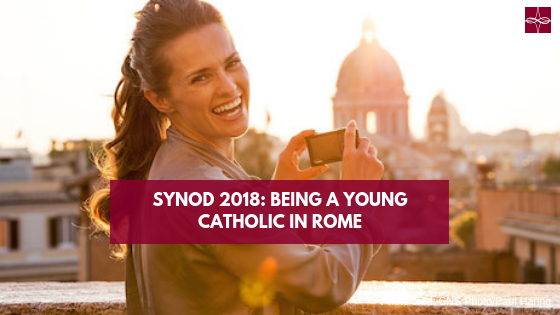

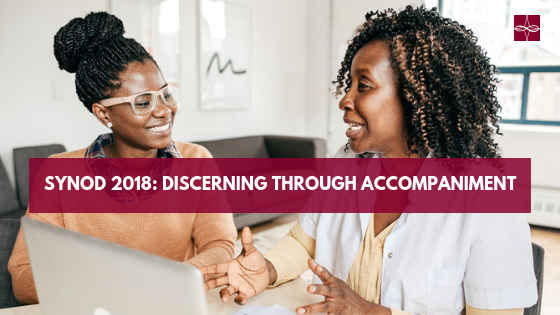

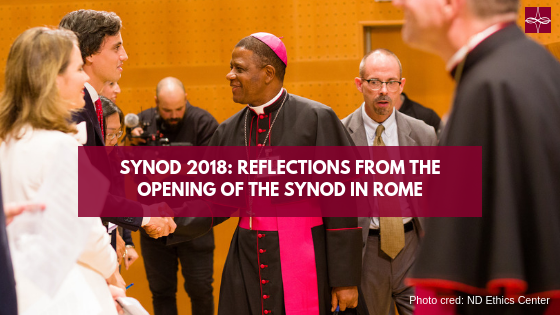

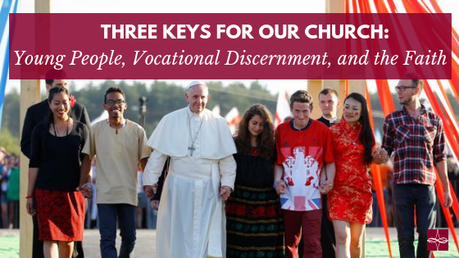

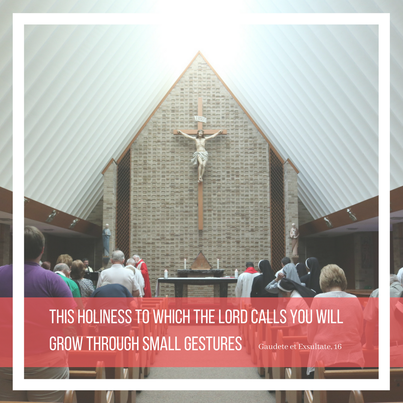
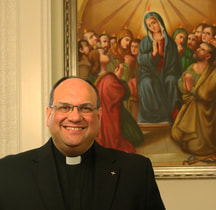

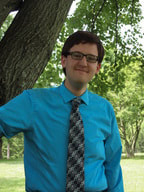

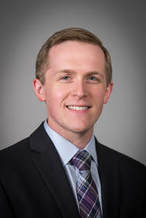


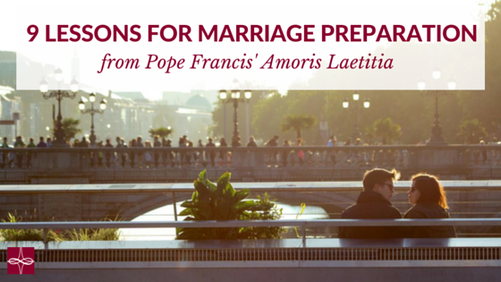

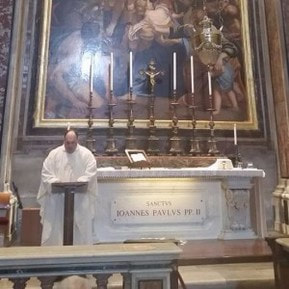
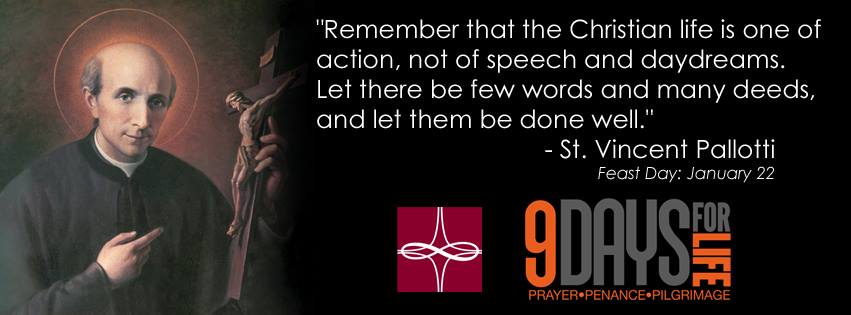
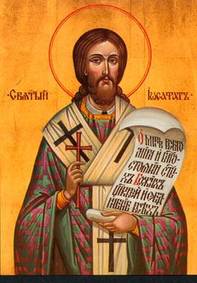
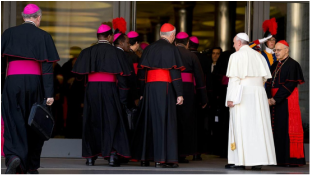


 RSS Feed
RSS Feed